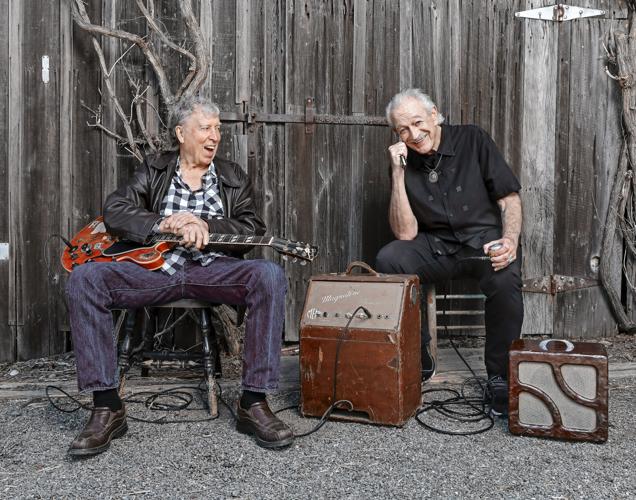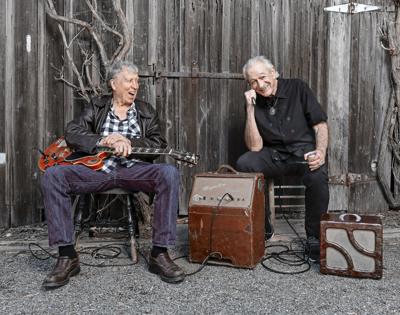Elvin Bishop and Charlie Musselwhite sharing a stage seems like the natural thing to do.
The two blues and roots music stars have known each other since they were aspiring young blues musicians in Chicago in the 1960s. Bishop and Musselwhite followed similar paths after they left the Windy City but never made an album together until 2020’s Grammy-nominated “100 Years of Blues.”
Bishop, a Rock and Roll Hall of Fame and Blues Hall Of Fame inductee, and Musselwhite, a Blues Hall of Fame inductee with 11 Grammy nominations and a Grammy win, are among the big names at this year’s Baton Rouge Blues Festival. They’ll perform together at 5:30 p.m. Saturday on the Visit Baton Rouge Swamp Blues Stage. Before the show, the duo will sit for an interview at 2:30 p.m. on the WRKF Behind the Blues Stage.
Singer-guitarist Bishop and harmonica master Musselwhite have, as their song and album title says, a combined 100 years of singing and playing blues. Despite all that blues experience, they only recently began working extensively together. It’s proven to be a fun partnership.
“We have so much fun doing what we do, the audience can’t help but have fun,” Musselwhite said. “We take turns doing tunes and tell stories and laugh about the good old days and the bad old days. It’s like we’re sitting around on our front porch.”
Perhaps surprisingly, back in the busy 1960s Chicago blues scene, Musselwhite and Bishop didn’t know each other well.

Charlie Musselwhite’s, left, and Elvin Bishop’s friendships and encounters with classic blues artists include seeing Slim Harpo, the subject of the 2024 Baton Rouge Blues Fest poster.
“Charlie had his circuit of clubs and musicians he hung out with and I had mine,” Bishop explained. “People always think I’m lying when I tell them there were easily more than 100 blues clubs in Chicago. There were so many great musicians there, so many good blues clubs, so many things happening in Chicago.”
At 18 years old, Bishop moved to Chicago from Tulsa, Oklahoma, enrolling in the University of Chicago because of its proximity to the city’s blues scene. Sitting in and gigging with major blues artists at night, he hung out with musicians during the day and, eventually, let his college studies slide while he pursued an invaluable blues education.
“It was easy to make progress in Chicago, because all the clubs were open till 4 a.m. every weekday and till 5 a.m. on Saturday,” Bishop said. “It didn’t matter who it was, Muddy Waters, anybody, they were glad to see somebody coming in at 2 in the morning to sit in. If you’d sit in and it sounded good, somebody might hire you.”
Unlike Bishop, Musselwhite didn’t know Chicago was America’s biggest blues town when he moved there in 1962. He left Memphis, Tennessee, and the South simply to earn a living wage. In doing so, he found himself in the company of blues greats Waters, Howlin’ Wolf, Sonny Boy Williamson, Big Walter Horton, Big Joe Williams and Louisiana musician expats Little Walter Jacobs, Buddy Guy and Henry Gray.
Musselwhite performed and recorded in Chicago but never earned enough money to leave his factory day jobs. In 1967, a month of well-paid gigs on the West Coast inspired his move west. Bill Graham’s Fillmore West in San Francisco was Musselwhite’s first gig, on a bill with Cream and the Paul Butterfield Blues Band. Coincidentally, the Butterfield band was a Chicago group featuring guitarist Bishop.
Bishop moved to the West Coast, too. At the Fillmore West, he jammed with Jimi Hendrix, Eric Clapton, B.B. King and the Allman Brothers. Going solo later with a mix of blues, country and rock, he scored two Billboard Hot 100 entries, “Travelin’ Shoes” and the Top 10 hit “Fooled Around and Fell in Love.”
Bishop’s and Musselwhite’s friendships and encounters with classic blues artists include seeing Slim Harpo, the subject of the 2024 Baton Rouge Blues Fest poster. In the late ’60s, Musselwhite played a show with Harpo — Baton Rouge’s most famous blues artist — at The Scene nightclub in New York City. He doesn’t recall seeing Harpo again, “but we had a real rapport and really enjoyed hanging out together. He did brilliant records. They don’t fade away with time. They’re just as good the first time you heard them as the last time you heard them. They’re timeless."



